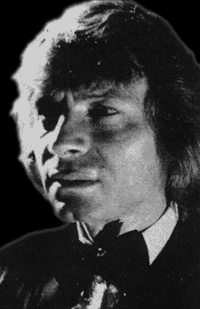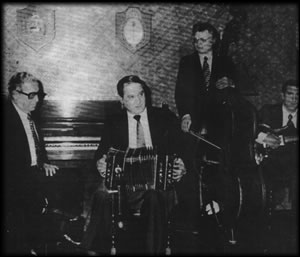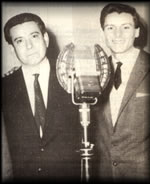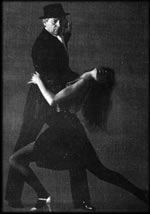By
Rodolfo - Julio Rodolfo, a manifold artist

e tould us: «My arrival in the world of music is simple, because I come from a family of musicians. My father played the double bass and two of my uncles were as well players. One played guitar and bandoneon, he was mom’s brother: Rodolfo Bértola. They even had a group named Los Errantes. It was the time of the famous bohemian players of the Trío Gedeón, and the former used to play a bit of everything, tangos and other beats. They also interspersed humorous dialogues. By watching them I was gradually getting used to that mood. They practiced in my house. Another uncle was member of a musical-comic group: Giovanetti-Catalano, which had stints in the cinema theaters of the neighborhood of Boedo.
 «At age five I was playing harmonica and, even before, they made me join Los Errantes as drummer. Certainly, they had bought me one according to my size. I was an addition, a charming note that the audience liked. Soon thereafter I began to recite and do something else.
«At age five I was playing harmonica and, even before, they made me join Los Errantes as drummer. Certainly, they had bought me one according to my size. I was an addition, a charming note that the audience liked. Soon thereafter I began to recite and do something else.
«My beginnings with the double bass was playing by ear, so my Dad told me that I had to study. My old man joined several outfits: Alberto Mancione, Emilio Orlando, and a large number of quartets that by then were fashionable. They appeared on the radio and later toured the cities of the interior. It was the time of the quartets fronted by Azzerboni, Enrique Mora, and Sara. They had plenty of job.
«Finally I entered the Conservatorio Municipal. I had a great teacher named Hamlet Greco. I spent five years studying and working at the same time. It was the era of the big orchestras. I recall that when I stepped out the door of Radio El Mundo, a crowd was waiting for the exit of the artists on the street.
«I played with Mancione, later I switched to Miguel Caló for a tour of Central America. My first professional gig was with Mancione and, before Caló, there was a stint with Pedro Laurenz. I rejoined the latter by the end of his career in 1970 but then I played and sang. Look how I skip in this chat. That year we played for a season at the Re Fa Si in Mar del Plata. Other names billed were Astor Piazzolla, Aníbal Troilo, Mario Bustos. I was the last singer with Pedro Laurenz, but I did not make a recording. We appeared at the Carnegie Hall of New York as part of a series of musical numbers. I remember that don Pedro used to go to bed very late and at the hotel he spent a long time watching comic cartoons on television. He very much liked them, they made him laugh.

«At the beginning with Laurenz I was bass player, a boy named Román asked me to do it, but as a substitute player. I played on Radio Belgrano, at dancehalls. It was unbelievable how much job there was then!
«By that time I was member of the Orlando Tripodi Orchestra when it backed the Florio-Durán team and Orlando was who introduced me to Miguel Caló. I played with a lot of people. Florindo Sassone was one of them, I also recorded a long-playing record with Fresedo, but the orchestra was conducted by Roberto Pansera because don Osvaldo was very ill then. The vocalist was Daniel Riolobos.
«I was with José Basso when he traveled to Japan in the mid- 80s. I had been there before with Fulvio Salamanca, the one that had discovered me as singer, and for the third time and, by now, the last with maestro Osvaldo Requena, singing and dancing. Ah!, I also was with the orchestra headed by Luciano Leocata on Radio Belgrano and at a cabaret of La Boca. At that venue, in the first part when there were not many customers, sometimes I dared to sing a little number. I always liked singing and accompanying myself on guitar.
«With the one I played many gigs was the bandoneonist Osvaldo Rizzo —aka Pichuquito—. We often appeared on television, we traveled to Europe in 1974. We were in Italy, Germany, Switzerland, Australia. We were simply his bandoneon and I on vocals. Previously, in Buenos Aires, we had formed a quartet with a boy known as Castrito, on guitar, I played the bass and Luis Correa was on vocals.
 «One evening, I think it was at the El Abrojito”, Fulvio Salamanca turned up. Because Armando Guerrico was leaving he was looking for a substitute. He was interested in Ángel Ramos, who at that time was known as De Santis, and he asked Pichuquito and Correa about it but the latter suggested that he should try me. They made him sit at the back. Correa approached me to tell me that he was not feeling well: «Why don’t you sing now instead of me?». So did I and therafter he proposed to me being Fulvio’s singer. Of course I didn’t believe him until they took me to his table and the bandleader himself confirmed it to me. Later from one of his pockets he took out the sheet music of “El último café” and he told me: «Practice it because we’re going to record it.», so I became a singer. My debut with the orchestra was in the recording studios. That day I was quite frightened. Correa, who was a good friend, took me to have a glass of gin and everything went all right. I was always with Fulvio since that December 19, 1963. I had a short tenure with Laurenz, but later I’ve always been with Fulvio, as singer and bass player.
«One evening, I think it was at the El Abrojito”, Fulvio Salamanca turned up. Because Armando Guerrico was leaving he was looking for a substitute. He was interested in Ángel Ramos, who at that time was known as De Santis, and he asked Pichuquito and Correa about it but the latter suggested that he should try me. They made him sit at the back. Correa approached me to tell me that he was not feeling well: «Why don’t you sing now instead of me?». So did I and therafter he proposed to me being Fulvio’s singer. Of course I didn’t believe him until they took me to his table and the bandleader himself confirmed it to me. Later from one of his pockets he took out the sheet music of “El último café” and he told me: «Practice it because we’re going to record it.», so I became a singer. My debut with the orchestra was in the recording studios. That day I was quite frightened. Correa, who was a good friend, took me to have a glass of gin and everything went all right. I was always with Fulvio since that December 19, 1963. I had a short tenure with Laurenz, but later I’ve always been with Fulvio, as singer and bass player.
«Dancing? I always danced, but professionally I did it with Requena. For his appearance in Japan he was requested to have someone that sang and danced in the show. Once again Pichuquito entered the scene and told him that I liked dancing and furthermore that he knew no one that would do both things. Requena summoned me and I told him that I danced but I was not ready to be onstage. He answered me: «There’s plenty of time to get it ready». So El Negro Raúl —who danced with Mariano Mores— and also Los Dinzel appeared to help me. And so with a little help of each one I was improving. My dancing partner was my wife who had learnt dancing when she was a young girl and was my dancing partner when we went to dancehalls and clubs. Today I love these three things: playing double bass, singing and dancing.
«The orchestra that I liked most, the one I enjoyed best as musician, was the one led by Basso. Because of its danceable beat and because he was a man that knew tango very much and he never missed its essence. I had a special love for Pepe.
«I traveled very much, now I’m having my third passport sealed. I’ve just come from Miami, I was there with Juan Carlos Copes. I lived nearly a year in Puerto Rico, I was in New Zealand and later, nearer, in Peru, Bolivia, and a long time in Venezuela. There I appeared in revues, and here in B.A., playing bass and dancing I was at the Teatro Astral alongside Jorge Sobral, a special kind of guy.
«I composed several tangos but only two were recorded. One was committed to record by Héctor Varela, featuring Víctor Daniel and Fernando Soler on vocals. The lyrics were written by Abel Aznar and I composed the music in collaboration with Pichuquito. It is a milonga and it is entitled: “No me vas a venir a buscar”. And the other: “Papá vecino de Estrella”, with lyrics by «El Gordo» Luis Ángel Formento. It was recorded by Rodolfo Lesica with the Alberto Di Paulo’s orchestra.
 «Who’s Edi Zulé? I don’t know, but she turned out to be an admirer of the orchestra. She lived in Barracas and when we appeared on Radio El Mundo she always was around. It was a beautiful time, at the same time we worked at Patio de Tango and on television, on Channel 11 in the program Yo te canto Buenos Aires, emceed by Julio Jorge Nelson. One day that lady approached me to tell me that she had a tango. Music and lyrics were hers. Fulvio was playing it on the piano and asked me to accompany him. When we finished it we looked at each other and as it turned out that we both liked it, he included it in the songbook.
«Who’s Edi Zulé? I don’t know, but she turned out to be an admirer of the orchestra. She lived in Barracas and when we appeared on Radio El Mundo she always was around. It was a beautiful time, at the same time we worked at Patio de Tango and on television, on Channel 11 in the program Yo te canto Buenos Aires, emceed by Julio Jorge Nelson. One day that lady approached me to tell me that she had a tango. Music and lyrics were hers. Fulvio was playing it on the piano and asked me to accompany him. When we finished it we looked at each other and as it turned out that we both liked it, he included it in the songbook.
«Besides what I owe him because he made me his singer, I regard Fulvio as a person exaggeratedly correct, unable to bother anyone, an honest fellow. As a musician he is one of the best pianists, with a solid training, he studied much. The Juan D'Arienzo Orchestra was transformed by him. He was the one who made it unmistakable.
«Singers? Gardel was a phenomenon with no explanation, we cannot say another thing. I also like Floreal Ruiz —he sang well with all the orchestras—, Francisco Fiorentino and also Alberto Marino, both in their tenure with Troilo. I’m also drawn by Ricardo Ruiz, Enrique Campos, Jorge Durán. As for bass players I admire Hamlet Greco, also Omar Murtagh and some other.
«Dancers?, Juan Carlos Copes, he made himself dancing, at the balls of the Club Atlanta. It’s very important that he was not trained at an academy. Others who were not renowned but danced very well were El Flaco Tin and Sarita who appeared at the El patio de la Morocha and today they run a restaurant in front of the railway station of González Catán; and now Miguel Ángel Zotto who’s going to be successful, surely».
Interview with Julio Rodolfo made on June 11, 1992.